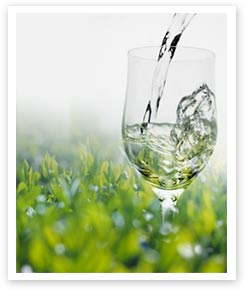|
|
 |
 |
The taste and aroma of tea are largely
dependent on the water. Pay special attention to the types
of water that yield rich, delicious tea.

Fukamushi (deeply steamed) tea for every type of water.
The leaves of Fukamushi tea are steamed longer than the standard
Sencha. Its aroma is fainter but it has a rich, bold taste.
If the quality of your water is not very good, we recommend
Fukamushi because it has the strength of its flavor to overcome
such deficiencies. Brewing time is relatively short-about
30 seconds-because the leaves are crushed. If you are able
to obtain good quality water, use Wakamushi (lightly steamed)
tea leaves to enjoy the delicate aroma and taste of green
tea.
Hard water for milder taste
Generally speaking, imported mineral water is not suitable
for green tea because of its hardness. Some say, however,
that tea made with European mineral water with a mineral content
as high as 300 mg is tasty, because it is mild and not astringent.
If you do not like a more astringent flavor, try hard water.
To make water better
The use of charcoal in water purification has recently become
popular in Japan. Placing charcoal in a container of tap water
will remove the smell of chlorine and purify the water. The
taste of the water will also be improved and you will be able
to make a more delicious tea. Boiling water in an iron kettle
is also recommended. The kettle's iron is eluted into the
water, which provides the benefit of being able to take in
the mineral when you drink the tea. Additionally, an iron
kettle will maintain the temperature of the hot water. If
you boil the water and let the kettle stand for a while, the
temperature will be most suitable for Gyokuro and Sencha.
|
|
|